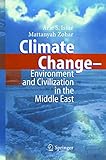Climate change: environment and civilization in the Middle East [Libro electrónico] / Arie S. Issar, Mattanyah Zohar
Por: Issar, Arie S [autor].
Zohar, Mattanyah [autor].
Tipo de material: Libro
en línea Editor: New York, New York, United States: Springer-Verlag Berlin Heidelberg, c2004Descripción: xxii, 252 páginas : ilustraciones, mapas ; 25 centímetros.ISBN: 3540210865; 9783662062647 (Online).Tema(s): Clima y civilization | Cambio climático
Libro
en línea Editor: New York, New York, United States: Springer-Verlag Berlin Heidelberg, c2004Descripción: xxii, 252 páginas : ilustraciones, mapas ; 25 centímetros.ISBN: 3540210865; 9783662062647 (Online).Tema(s): Clima y civilization | Cambio climático| Tipo de ítem | Biblioteca actual | Colección | Signatura | Estado | Fecha de vencimiento | Código de barras |
|---|---|---|---|---|---|---|
| Libros | Biblioteca Electrónica Recursos en línea (RE) | Acervo General | Recurso digital | ECO400565273126 |
Incluye bibliografía e índice (página 241-252
1. The pendulum of paradigms.. 2. Constructing the jigsaw puzzle of palaeo-climates.. 3. The near east: a bridge from the garden of eden to the fields of toil.. 4. The great transition - from farming villages to urban centers.. 5. The urban revolution and the dawn of history.. 6. Dark age, renaissance, and decay.. 7. Migrations and settlings.. 8. The age of iron and empires.. 9. Crusaders, mamluks, and ottomans on the eve of the era of industry (ca. 800 C.E. To the present.. 10. An epilogue.. Index
Disponible para usuarios de ECOSUR con su clave de acceso
We live in an early stage of an interglacial period, which began some fifteen thousand years ago - a warming trend which, with the extreme ups and downs, is . still gaining momentum. There is little doubt that, sometime in the foreseeable future, the global climate will inexorably become much warmer l and many regions, such as the Near East, will become much drier. We even accelerate this process by recklessly pumping carbon dioxide from fossil fuels into the atmosphere. And if that is not enough - industrial, agricultural and disease-ridden human waste unfit for consumption will increasingly pollute the diminishing few remaining water resources. By now, we fully realize the disastrous consequences of what we do, and yet go on doing it. So what about the "Intelligence of the Homo sapiens" about which we read in our books? Obviously, one of the qualities of intelligence is the capacity to forecast the future on the basis of past experience. Since writing was invented and important or mundane matters were recorded in our region, many stories about disasters emerging either from shortage or superabundance of water are found. The one, as well as the other, often decided the fate of ancient peoples. The inherent historical understanding of the crucial role of water in the fate, and thus faith, of the human societies faded out when it moved from the semi arid western part of Asia to humid Europe. eng
Disponible en línea
Disponible en formato PDF
Subscripción a ELSEVIER 26 de diciembre del 2013
